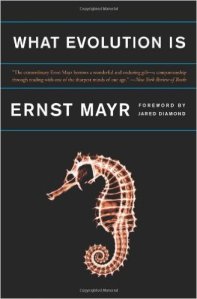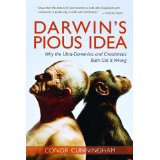Mayr, Ernst. What Evolution Is. (Basic Books, 2002) $9.99 Kindle/$12.91 Paper
Truly wanting to understand the theory of evolution as it is currently held and the evidence for it, I asked a fellow church member who is also a biologist to recommend a book that would describe the theory to me in a non-polemical tone. That is, I wanted to read a contemporary account of the theory of evolution by someone who was not also trying to convince me either that I ought to be an atheist or that I ought to reject the evidence if I wanted to remain a Christian. Nor was I looking for books about theistic evolution or Intelligent Design. I wanted a book about the scientific theory of evolution as I might want a book about string theory or the nature of blackholes.I am a Theologian and Biblical Scholar. I can figure out to do with it later (not on my own but later).
I expected my friend to give me the title of a textbook that I would have to borrow from the Baylor library. (Textbooks are usually expensive.) To my pleasant surprise, he recommended this short yet comprehensive book by Ernst Mayr called What Evolution Is. At under ten dollars on my Kindle, I could forego a couple Caramel Macchiatos from Starbucks to get this one.
To my friend’s surprise, I immediatley downloaded it to my Kindle, read it over the next week and came back to church with my questions. This brief conversation sparked a friendship. In time, our conversations resulted in the formation of a weekly informal, interdisciplinary lunchtime discussion of questions related to “God and Nature” at Baylor. On a regular basis, we have faculty, staff, and students from a variety of disciplines (physics, business, biology, religion, computer science, anthropology, philosophy etc.) getting together to discuss how we integrate our growing knowledge of God’s Creation and our Theological convictions.
Some of the entries I have posted have come out of or been shared at these discussions. For instance, for our opening discussion they asked me to present my ideas about Ken Ham’s Humean Skepticism. I was happy to see that we had a philosopher present who was teaches courses on David Hume to see if I had Hume correct. I did. (Whew! I better. I took his course and wrote on Hume.)
If you are like me and want to understand the theory of evolution as it currently stands, then I highly recommend Mayr’s little book What Evolution Is. You could read and probably should read Charles Darwin’s The Origin of Species because of its historical importance. But that is somewhat like reading Copernicus on Astronomy. Or perhaps more like reading Einstein’s work instead of reading current physics on the nature of the universe. Did you know that Einstein initially rejected the idea of an expanding universe because he thought it was “bad physics”? Even Einstein needed a paradigm shift. Darwin is easier to read than Einstein.
One thing that I have come to realize in learning about the latest in evolutionary thinking from this book and the work of Francis Collins is that atheistic apologists like Richard Dawkins are not only wrong about Christianity, their presentation of evolution is outdated. Either in a book or in an interview, Francis Collins’s suggests that based on his work with the Human Genome Project, he wonders if the idea of the “gene” may go the way of the “atom”. (Remember, “atom” means uncuttable and was believed to be the smallest material object. We have surely moved beyond that idea.) So, like the very people they criticize, they are building their philosophical worldview, i.e. memes and selfish genes, on outdated scientific knowledge. Scientific knowledge is by the nature of the discipline always changing and being reformulated. That is why textbooks are so expensive. They must undergo regular revision.
While there are many popular books available on the theory of evolution, most of these books are written with a polemical tone. Moreover, most of these authors, like Dawkins, seem to make two problematic assumptions. First, they assume the conflict model of science and religion and argue from that perspective. (The conflict model was influentially promoted, if not invented, in works like that of A.D. White. See the relevant chapters in Ronald L. Numbers Galileo Goes to Jail for a thorough critique (or, perhaps, annihilation) of White’s thesis.) Second, they seem for the most part to accept that the “literalist” intepretation of Genesis 1-3 is legitimate and dominant intepretation for Christians. (For one of the best books on understanding Genesis 1, see John Walton’s The Lost World of Genesis One or listen to this talk by Rikki Watts “Making Sense of Genesis 1“.)
In my experience, if their goal is to promote and educate the public in current scientific theory, then these assumptions are a distraction at best and a stumbling block at worst. If their goal is to reinforce or reify atheism and Young Earth Creationism, then they are succeeding. (On this problem, read Conor Cunningham’s Darwin’s Pious Idea or watch his BBC Documentary Did Darwin Kill God?
So, even if you are approaching the theory of evolution from an antoginistic perspective, you should read Mayr’s book. One of the first and foundational lessons I learned from J.I. Packer at Regent College is that you should know your opponent well. (Hear Packer teaching.) That is, you should be able to fairly and adequately present an opposing position in such a way that those who hold that position will be able to say, “Yes, you have understood me. That is the position I hold. Now, where is it that we disagree?” That is a scholarly ideal and I think is good Christian practice.
(Now, as I hope you can see from this website, there is still room for fun and sarcasm. I see my blog as a particular genre but I hope that one can also see substance and a thirst for understanding behind the more pointed critiques. After all, in his lectures, Packer is known for his one-liners, like “The New Age is simply Gnosticism in a mini-skirt.” or maybe even from the same lecture “Shirley MacLaine went ‘Out on a Limb‘ and never came back.” or “Some theologians say that God does not speak, ‘He says that He does!” or too his students return late from their break “Now, when I said 10 minutes, I meant 10 minutes of 60 second intervals each.”)
[I am currently developing a page that is a bibliography of good books that I have read on this topic called Christianity and Science. I will add a link soon.]


Ian,
Nice piece. I am a Jew, yet a Deist (don’t ask) whose attitude towards a creative force informing the Universe, is skeptical, but open. My wife is of the same mind (which is helpful in a marriage) and of our two Daughters our elder one is a traditional Jew, with a learned background in Judaism and my younger one is an atheist. I am proud of my heritage and love being Jewish, even if I’m not at all observant, or in any sense God-fearing.
However, my view of Dawkins is similar to yours and that has been the case from when I read his first book “The Selfish Gene”, which I saw not as science, but as self-serving hogwash. From a theological and from an historical standpoint I don’t see Genesis in any way precluding evolution. That is because in my opinion Genesis was always meant to be read as metaphor, in that respect I think that is true of the entire Torah.My view on all religions isn’t negative per se, because I recognize the need of some humans to see their existence and the Universe as having some purpose beyond random chance. If that gives them comfort who am I to object, or even to say they are wrong. The problem with religion though is that it seems most religions have been co-opted by an establishment that makes their living from it. Rather than promoting the wisdom of the teachings, this establishment needs to promote fear in their congregants.
As far as I know Confucius was the first to expound on what we call Jesus’ “Golden Rule”, followed by The Buddha, Jesus and contemporary of Jesus, Hillel the Elder. In life I use that formulation to guide me in my dealings with others and so far at 70 it has done me in good stead.
LikeLiked by 1 person
Thank you for your thoughtful comments. I am a Kierkegaard scholar. So, I totally understand your concern with “establishment religion”. Kierkegaard was concerned that Christians forget that life is a task. He felt as though the established Church in Denmark was more akin to theatre than to the Christian ideal. Thank you for sharing about your family. Blessings on you, IP
LikeLiked by 1 person
Ian. Thanks for dropping by my blog. I just read your article and am glad I did. I will probably buy the Mayr book tonight. I have not taken the time to really understand evolution, especially genetic theory. I am tired of all the politics and stuff we are exposed to everyday, and taking a side trip through genetics and evolution sounds like just the thing to do.
Your article is very good and thought provoking, as are the comments.
LikeLiked by 1 person
I’m glad that you found it helpful. I hope that you enjoy Mayr’s book as much as I did. It answered many of the questions that I had wondered about with my cursory understanding. It also sparked new questions. There are always gaps in scientific theory. If there were not, then scientists could shake hands, pat each other on the back and say, “good job, we’re done.” One particularly convincing aspect is biologists ability to predict where a transitional fossil will likely be found and then lo and behold they find it.
Follow the link to Naturalis Historia blog from my home page. It belongs to a biologist in OH. I have been enjoying it. IP
LikeLike